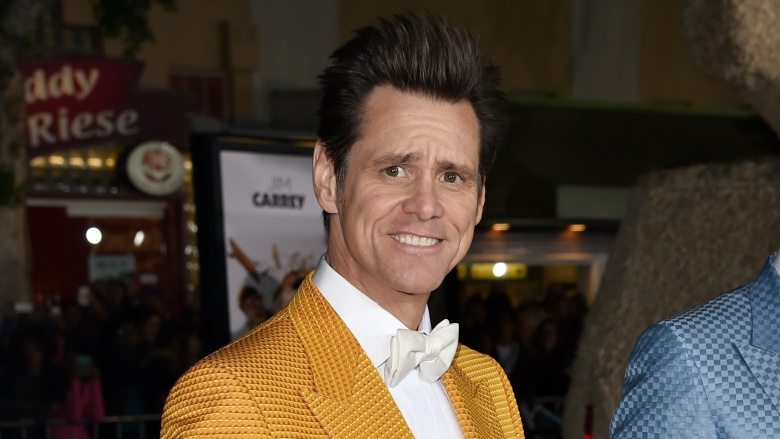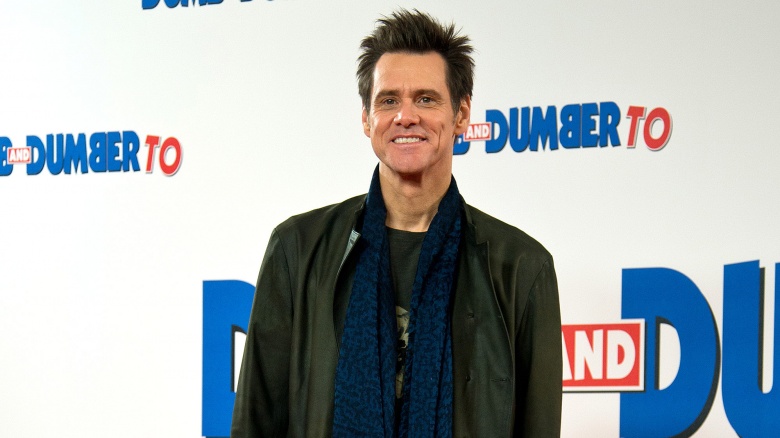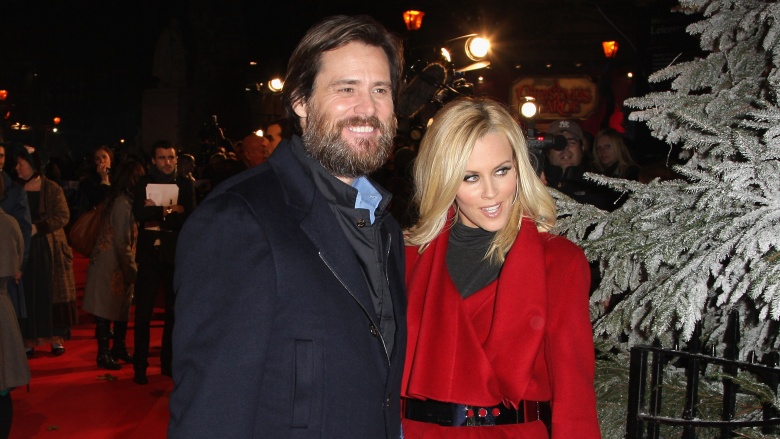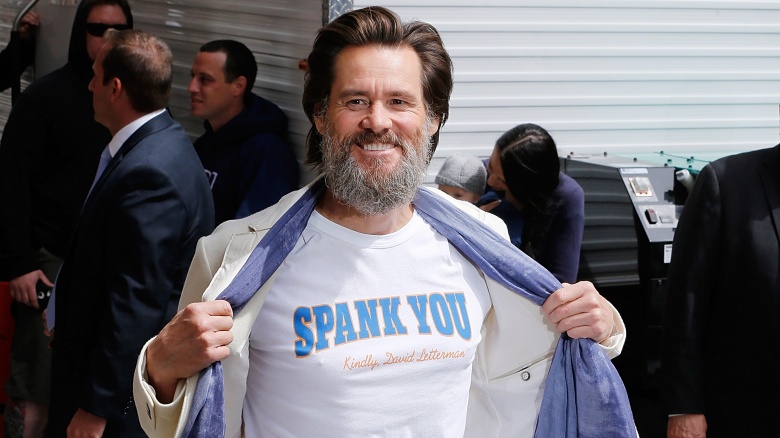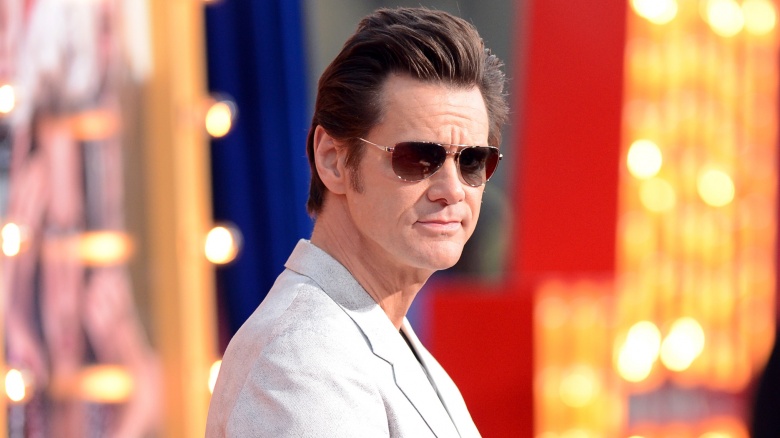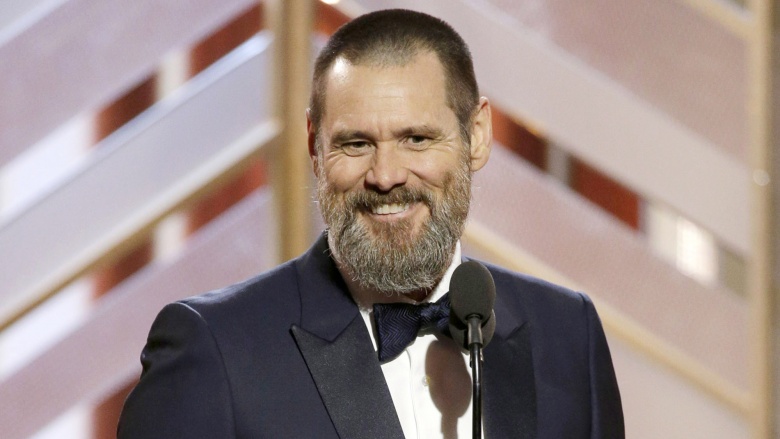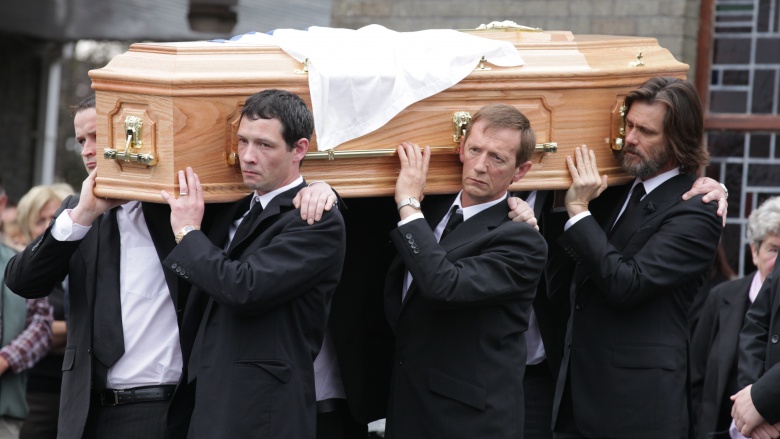The Double Life Of Jim Carrey
Jim Carrey is easily considered one of the greatest comedic actors of all time, but the rubber-faced funnyman is not without a dark side. Despite his espoused beliefs in mindfulness, meditation, and the pursuit of enlightenment through creativity, he's been mired in controversy over gun control, vaccinations, and now, the questionable death of his ex-girlfriend, Cathriona White. He also endured a tumultuous upbringing that included dropping out of school, dealing with mental illness, and even homelessness. If you thought Carrey was just a goofy guy who could contort his face a million ways and talk through his butt, think again. He's been leading a double life.
His childhood wasn't the greatest
You would think a guy like Carrey, someone who prides himself on bringing joy to others, would have a deep well of personal happiness to draw from. While that may be the case now that he's a successful entertainer, it certainly wasn't the situation when he was a kid.
In an uncharacteristically candid 60 Minutes interview, Carrey discussed his rough past that started around age 12, when his dad lost his accounting job. "My family kinda hit the skids. We were experiencing poverty at that point. We all got a job, where the whole family had to work as security guards and janitors. And I just got angry," said Carrey. "I was angry at the world for doing that to my father. I wanted to bash somebody's head in, basically." Carrey dropped out of high school to work, and to make matters worse, the boy was constantly trying to cheer up his mom who, according to him, "laid in bed and took a lot of pain pills."
Though his father's unemployment was a source of family misery, it also served as inspiration for Carrey, who decided to pursue his dream of fame at all costs. During a convocation speech at the Maharishi University School of Management, he said "I learned many great lessons from my father, not the least of which, was that you can fail at what you don't want so you might as well take a chance on doing what you love." Carrey heeded that advice and started performing in clubs, eventually moving to Los Angeles where he lived out of a van while slowly making a name for himself in the comedy world. That kind of desperation has ruined countless lives, but for Carrey, it somehow opened something up for him, and through that door he would armpit fart, mug, and pratfall his way to being one of the highest paid actors of his time.
He's a serious painter
Casual fans know Carrey as the guy who once fell completely naked out of a mechanical rhino's butt in Ace Ventura: When Nature Calls (1995), which means this is probably the kind of guy who, in his real life, they'd expect to pride himself on his extensive collection of fake dog poo. But that couldn't be farther from the truth. On an episode of Jerry Seinfeld's show, Comedians in Cars Getting Coffee, Carrey brings Seinfeld to his art studio in Los Angeles, which is a cavernous room full of the actor's work, including drawings, sculptures, and some very large-scale paintings. He tells Seinfeld he's never shown the public his work before, and refers to the studio as both "my heart" and "the womb," so yeah, he's pretty serious about it.
However, some people were aware of Carrey's off-screen passion prior to his 2015 appearance on Seinfeld's show. In fact, it was 2011 when he staged his first gallery show called "Nothing to See Here" at Heather James Fine Art, which featured 40 of his original works. According to Palm Springs Life, the guest list to view Carrey's art was exclusive, so while it wasn't a loud declaration of his passion, Carrey did say painting had become a full-time endeavor for him, and he intended to use it to reach people the way he previously had through acting. "Bringing Freedom From Concern has been my life's mission from the time I knew I could bring relief as a child, first to my family, who struggled with illness, addiction, and poverty, and then to the world," he said in his artist's statement (via Palm Springs Life). "It is what I now seek for myself: freedom through honesty, freedom through absurdity, freedom through expression of every kind. My greatest hope for this exhibition is that you find something here that stops the world for you."
He has conflicting ideas about conventional medicine
During the same 60 Minutes interview in which he revealed his turbulent past, Carrey also talked about using Prozac to treat his depression. While it's perfectly normal to treat depression with pharmaceuticals, it is arguably odd for Carrey to have done so, since he is such an outspoken critic of other conventional medicines, such as vaccinations.
Carrey has participated in high-profile anti-vaccination activism alongside then-girlfriend Jenny McCarthy. He also once wrote a piece for The Huffington Post in which he not only questioned the number of vaccines given to children, but also the dosage and ingredients that comprise the vaccines. "I agree with the growing number of voices within the medical and scientific community who believe that vaccines, like every other drug, have risks as well as benefits and that for the sake of profit, American children are being given too many, too soon. One thing is certain. We don't know enough to announce that all vaccines are safe!"
There may be no more controversial topic on the internet than the anti-vaccination movement, so we're not going to pick a side. We'll simply pose this question: why did Carrey feel okay turning to pharmaceuticals to treat mental illness, but he's not comfortable relying on medicine to thwart other diseases, such as measles, mumps, and rubella?
He's into motivational speaking, like, way in
In 1997, Carrey revealed on Oprah that he attributes some of his success to "visualization," meaning he imagined himself achieving great success so much, that in essence, he willed it to happen. Carrey said he was so sure he'd make it, he even wrote himself a $10 million dollar check dated for 1995, which he promised himself he'd cash. In 1994, he was paid that amount for Dumb & Dumber (1994), a coincidence that cemented his lifelong pursuit of new wave spiritualism.
A few years later, during a speech at something called the Global Alliance for Transformational Entertainment, Carrey doled out more new-age wisdom, speaking again about the power of intention, as well as the spiritual awakening he once had in the form of an out-of-body experience in which he "understood how thought was just an illusory thing, and how thought is responsible for if not all, most of the suffering we experience." He said he's been chasing that experience ever since, and that his goal is to help as many people as possible achieve the same level of enlightenment.
Seeing the guy who got famous playing a character that's a burn victim with no lips addressing a convention like he's suddenly the love child of Deepak Chopra and Tony Robbins is surprising, to say the least, and downright bizarre if you really think about it. Seriously, Fire Marshall Bill can show us the path to spiritual enlightenment? Come on.
He pulled his support for Kick-Ass 2, but still took the money
In keeping with his travel on the path to transcendental oneness with all things, Carrey had second thoughts about his role in Kick-Ass 2 (2013), the ultra-violent adaptation of the graphic novel of the same name. In it, he plays Colonel Stars and Stripes, the leader of a group of vigilante crime fighters. The movie features all manner of physical violence, including people being shot, stabbed, and violently killed in almost any way imaginable. Carrey signed on for all of this and seemingly had no issues until the Sandy Hook massacre happened, after which he retracted his support for the film, tweeting (via MTV News), "I did Kick-Ass 2 a month b4 Sandy Hook and now in all good conscience I cannot support that level of violence. My apologies to others involve[d] with the film. I am not ashamed of it but recent events have caused a change in my heart."
Carrey then resumed his protracted Twitter war with gun enthusiasts—who he'd previously irked with his Funny or Die video parodying Charlton Heston's famous "cold dead hands" speech. The gun rights activists and the film's director rightfully pointed out that Carrey cashed his paycheck for Kick-Ass 2 anyway, despite his supposed reservations. So was Carrey's posturing about the film merely a way to reopen a debate with the Second Amendment crowd, or did he truly have a problem with all of the violence in the movie? After all—spoiler alert!—his character in the film sics dogs on criminals and beats bad folks with a bat before he's ultimately beheaded, but it's not like there are pro-baseball bat beatdown groups on social media to argue with, so we guess one just has to choose one's battles.
He was Tupac's prison pen pal
Jim Carrey's aversion to violence may have been nonexistent before the Sandy Hook massacre because, according to his IMDb, he wrote rapper Tupac Shakur letters while he was in jail to cheer him up. That may seem innocent enough, except Tupac was serving a sentence for first-degree sexual abuse in a disturbing case involving a female fan who claimed the rapper allowed members of his entourage to force themselves on her in his hotel room. Aside from that, Shakur had a long history of alleged violence, including gunfights and assault, not to mention his involvement in the infamous East Coast/West Coast hip-hop rivalry that would ultimately claim not only his life, but also that of rapper Notorious B.I.G. Granted, Carrey may have somehow been oblivious to the legal troubles of one of the most famous rappers in the world at the time, or maybe he was just a really big fan of "California Love," but one thing is for sure, Shakur's rough life didn't slow down Carrey's fanboy antics.
The death of his ex-girlfriend is shrouded in mystery
Cathriona White was Jim Carrey's long-time, on-again, off-again girlfriend who tragically took her own life in 2015. She addressed him in her suicide note, saying "I'm sorry you felt I wasn't there for you. I tried to give you my best part," as well as "Please forgive me. I'm just not for this world." According to People, the couple split for the second time just one week before her death, so the impact this had on Carrey must have been immense.
But that's really just the beginning, because one year after her death, White's estranged husband, Mark Burton, filed a wrongful death suit against Carrey, claiming that not only did Carrey furnish the drugs White used to kill herself, but he also allegedly gave her three STDs before breaking up with her, the shame of which Burton claims led to her suicide. Carrey denied the allegations, but was then slapped with another lawsuit, this time from White's mother, Brigid Sweetman, which echoes the Burton suit and further alleges Carrey was abusive and controlling toward White throughout their relationship.
In his statement addressing the lawsuits, Carrey dismissed every accusation as a shameful exploitation attempt, saying in part, "What a terrible shame. It would be easy for me to get in a back room with this man's lawyer and make this go away, but there are some moments in life when you have to stand up and defend your honor against the evil in this world." That kind of sounds like a boast about how easy it would be for a rich guy like him to just write a check, as well as an overly melodramatic way to characterize accusations that could have merit. Not to mention, what if the accusations about the illegally obtained painkillers and STDs are proven true? It's going to take a crap-ton of crystals and yoga to cleanse that chakra.


